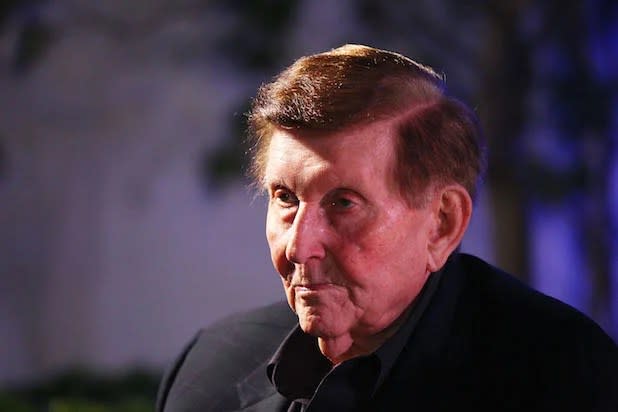Hollywood’s Family Business: Paramount Passes From the Redstones to Ellisons
Hollywood started out as a family business, and in many ways it still behaves like one — with in-fighting and blood feuds and vicious back-biting that only seems to happen among the closest of relatives.
From a book I recently read I learned this: “Jack and Harry Warner” — yes, those Warner brothers — “loathed each other. Harry once chased Jack around the lot with a lead pipe, shouting that he was going to kill him and had to be forcibly, restrained and disarmed to keep him from making good on his threat.”*
But in modern times, whether it was called Viacom or CBS or Paramount Global, Paramount has been an actual family business. It was listed publicly on the stock market, but has very much been in the control of the Redstone family since 1994.

Since the death of her father Sumner Redstone in 2020, with whom she had a close but complicated relationship, Shari Redstone has been the controlling shareholder of National Amusements, Inc., which owns 77% of Paramount voting stock. Her stamp has long been on the company — from facing down a legal challenge to her control by former CBS chief Les Moonves in 2018 to firing CEO Bob Bakish earlier this year to finally deciding to sell it at all.
If the deal that Paramount’s board agreed to on Sunday goes through, the historic studio will pass into the hands of another family, the billionaire Ellisons family, who will not only hold Paramount’s purse strings but also control the company.
While Sumner Redstone’s fortune was built off the early wealth his father Michael created by building a chain of movie theaters in the Northeast — the Ellisons built their fortune in a single generation on the gargantuan riches amassed by early technology titan Larry Ellison, the co-founder of software giant Oracle. Ellison, the fifth-richest man in the world, according to Forbes, is backing his son David to the tune of $6 billion in his merger of Skydance Media with Paramount Global.
“My father and I talk all the time,” David Ellison told TheWrap in a call with media on Monday after the deal closed. “He is an incredible advisor, across the board, and he has been throughout the process… I’m incredibly grateful for his leadership and advice.”

This dynamic feels considerably more personal than, say, a big telcom stepping in, or a hedge fund. But as one analyst told TheWrap, it matters a lot how big that stake is, and who the family is.
“There is a huge difference in the Redstone control compared to the Ellison control, and it is this: The Redstones only owned 10% of Paramount despite having voting control; the Ellisons and co. will own as much as 70%,” observed Matt Dolgin, a senior equity analyst at Morningstar Research.
“That means that their economic interests will be much more aligned with the majority of other shareholders, whereas the Redstones were not necessarily. The voting control plus so much skin in the game makes for a better ownership structure for Paramount long term than a traditional structure, because it can do what it believes is best for the company’s long term health amid the industry disruption without feeling pressure that executives’ jobs may hinge on near-term results,” Dolgin added.
Larry Ellison has been investing in Hollywood for some time. He helped bankroll — and then took over — daughter Megan Ellison’s Annapurna, which made several high-quality pictures but lost lots of money and saw her step back from the business in 2019. (The company still exists and appears to be focused on indie gaming.)
*****
Family control of a Hollywood studio may hark back to the origins of Hollywood, but it contradicts the shift in the last 50 years toward a more professional, corporate entertainment industry. In general, these have been led not by swashbuckling mogul figures but by CEOs with advanced business and law degrees advised by Wall Street experts recommending mergers with related or unrelated businesses. (To wit, AT&T, internet company AOL or video gaming giant Sony.)
But it’s not at all clear that the pressures of the market produce notably better outcomes for Hollywood. The AOL-Time Warner merger in 2000 was a notorious blunder. AT&T’s acquisition of Time Warner, which closed in 2018, lasted all of four years.
It’s equally unclear that private equity or hedge fund capital or foreign investment — all of which have come flooding into Hollywood over the decades — create reliable profits and stability.
That may or may not have been on Shari Redstone’s mind when Apollo Global Management and Sony Pictures Entertainment came in with a rich counter-offer to Skydance.
One thing seems clear. Of all the suitors who came for Paramount, Redstone had a clear bent toward the Ellison option. Practically every Wall Street analyst recommended the break-up of Paramount Global for parts. The math of this calculus is unassailable. The various divisions — whether Pluto, or BET or Paramount Pictures — are worth far more when broken into pieces.
But Redstone did not want that to happen. For her, the Ellison-Skydance option will preserve, for the most part, the integrity of what her family built.
Which raises a different question.
What will be the legacy of these fortunes created by the tech economy? Mark Zuckerberg at Facebook/Meta, Bill Gates at Microsoft, Jeff Bezos at Amazon — their riches have come so fast and in such vast quantities that dynasty has not had time to enter the picture.
Several of the early tech billionaires have found themselves drawn to media and entertainment, whether Lorene Powell Jobs who now owns The Atlantic magazine and Anonymous Content; Bezos who bought The Washington Post; or Elon Musk who owns Twitter/X.
They join other dynastic families in Hollywood and media. NBCUniversal is controlled by Comcast CEO Brian Roberts and the Roberts family; the Sulzbergers still reign at The New York Times.
It remains to be seen if the Ellisons will create a legacy.
For what it’s worth, the founder and driving force behind Paramount (which started under the name Famous Players in 1912) was a Hungarian Jewish immigrant named Adolph Zukor. He started out as a lowly furrier, but by the time he got to Hollywood he was a wealthy entrepreneur with an 800-acre estate in New York’s Rockland county.
Zukor ran the studio until he finally retired from Paramount Pictures in 1959. In 1964 he became the chairman Emeritus. He stayed in that role up until his death at 103.
Lucas Manfredi contributed to this column.
*From “An Empire of Their Own,” by Neal Gabler
The post Hollywood’s Family Business: Paramount Passes From the Redstones to Ellisons appeared first on TheWrap.

 Yahoo Finance
Yahoo Finance 